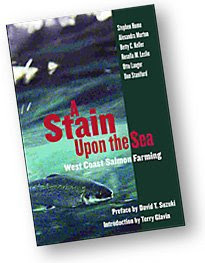
The "signatures are still rolling in unabated" says Alexandra Morton in her latest letter to Minister Shea and Premier Campbell, and the count currently stands at 10,465.
This is great news. It will be interesting to see how the DFO responds to the five demands of the petition, though you can expect the sort of PR mumble seen on their "Myths and Realities about Salmon Farming" page.
This DFO"reality" is my favourite: 'Habitat Officers routinely review sites in order to prevent harmful alteration, disruption or destruction of the oceans and freshwater habitat.'
Hmm... if DFO officers are not monitoring bycatch, disease outbreaks, ocean-bottom destruction, and the attraction of marine mammals and wild baitfish to the farming pens... what exactly are they doing in these salmon farm "reviews"?
Alex's letter, and the petition with the latest signatures, is now posted at her Adopt-a-Fry website.
If you haven't already, check out the six-minute "In a Nutshell" documentary above. It's one of several excellent videos by Twyla Roscovich, a young film-maker who has spent a lot of time (months? years?) with Alex in the Broughton.
(This is the full post, so please ignore the automatic "Read Full Post" link here.) Read Full Post








